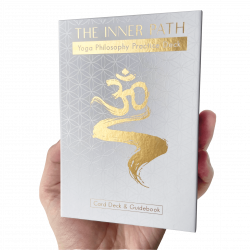
Japa is derived from the root ‘jap’, meaning “to utter in a low voice, repeat internally, mutter”. It can be further defined as ‘ja’ “to destroy birth, death, and reincarnation” and ‘pa’ meaning “to destroy one’s sins.”
Card Symbology:
The sacred symbols spiralling out of the mouth are names of the Divine. According to yoga and modern physics, everything in existence is made of vibrations. In the depths of japa it can feel that we are one with the Void, where the sounds themselves are emerging through us.
“On the bead of my breath, I remember the name of my Beloved”
– Mirabai
1.27 – 1.29 tasya vachakah pranavah / tat japah tat artha bhavanam / tatah pratyak chetana adhigamah api antaraya abhavash cha
The sacred word for the Creative Source is OM, called pranava. This sound is remembered with deep feeling for its significance. From that remembering comes the realization of the individual Self and the removal of obstacles. — Patanjali
Exploration:
There is a beautiful punjabi word – simran – which means ‘remembrance’, and also ‘meditation’. The whole work of yoga is to help us remember and live our Divinity. Japa, as a practice of remembrance, is perhaps the simplest passport to God and a universal practice in all faiths.
In yoga, japa is a sonic meditation that brings us into the resonance of unity, or Oneness. This rhythmic style of chanting leads you beyond the discursive mind and into a state of absorption with a desired thought-form or energy. Constant repetition of a mystic syllable, sound, prayer, spiritual saying, or divine name helps one attain union with a spiritual reality. It can be chanted aloud, whispered, hummed, or internalized mentally.
Notice how when you sing with a piano your voice is more in tune? Or when you’re in the presence of a safe and loving person you feel calm or uplifted? Your vibration harmonizes with your external influence. The ancient yogis, knowing this, made the conscious repetition of mantras and divine names an integral part of accessing higher frequencies, meditative states and opening the heart to God.
There’s an abundance of mantras and divine names that can calm your mind, heal your body, and elevate your spirits. Have you found the ones that resonate with you? Remember that japa is a practice universal to all faiths – you may find a name or mantra that comes from any spiritual tradition. Japa is most powerful when it comes from the heart and when it is done with conscious intent.
A Story:
Someone once asked Meher “Baba, I have heard that it is beneficial to repeat the divine name, but which name is best to repeat?”
“Do you love your wife?”
“Yes, Baba. I love her very much.”
“What would you do if she were staying far away from you?”
“I would remember her, of course.”
“Would you remember her with a rosary in your hand? Would you sit in a corner and repeat her name?”
“No, I would think about her spontaneously with love.”
Baba stated, “In the same way, automatic remembrance of God in a natural way is what is worthwhile. And without love, it is not possible. When there is intense thirst for the remembrance of the Beloved, love is born, and one’s only thought is of the Beloved. This is called real japa. Then, even the impossible becomes possible. It is the glory of the name.”
Just poses are not enough, discover a yoga approach that transforms yourself and your students. Integrate body, mind and spirit through mantra, asana, philosophy, meditation, raga music and breath.
Carry the wisdom of yogic science wherever you go with this yoga oracle and practice deck : featuring 26 art cards and wisdom guidebook.




